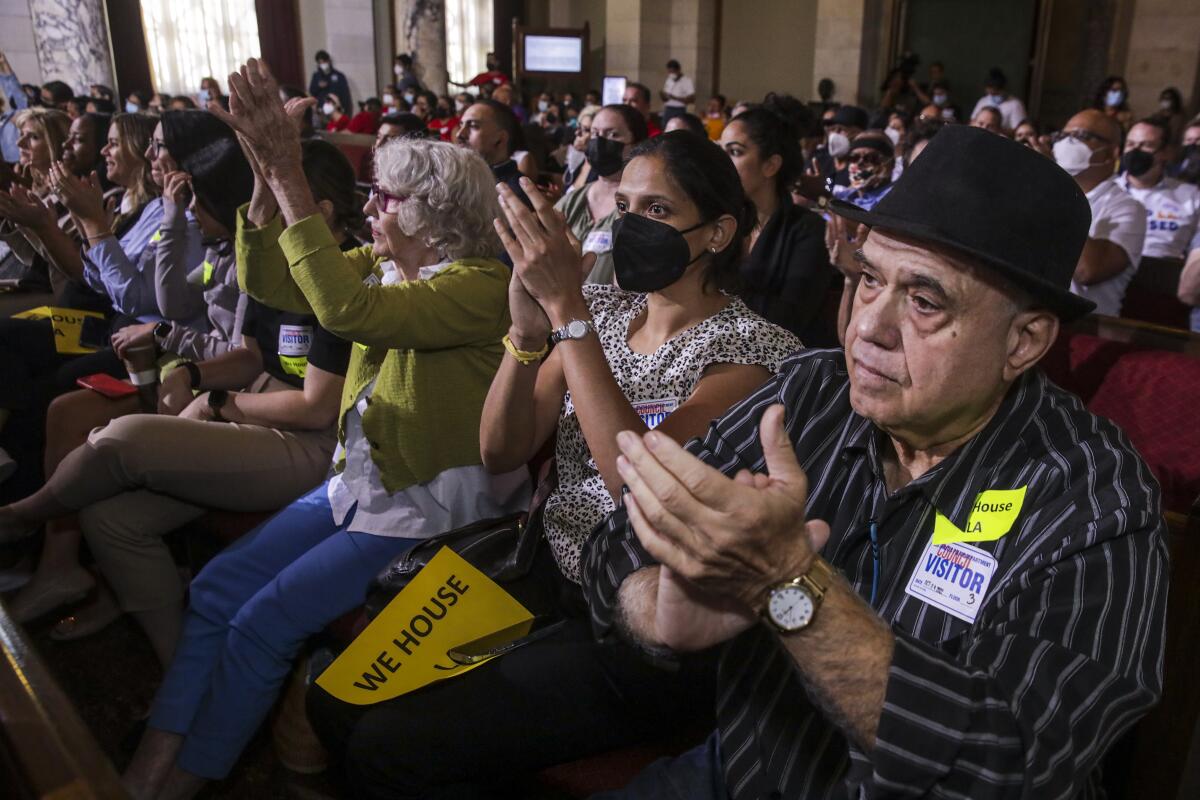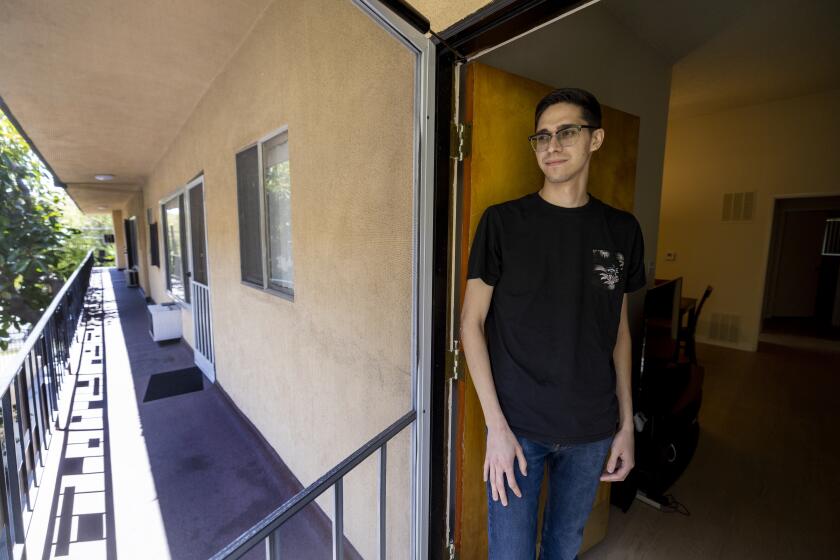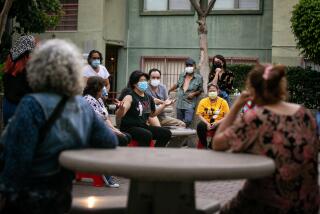L.A. County’s eviction moratorium has expired. What does that mean for renters?

The last day of March marked the end of Los Angeles County’s pandemic-era eviction protections.
Even before then, evictions had been on the rise. In the last year, eviction filings across the county have returned to pre-pandemic levels of more than 3,000 per month, according to Kyle Nelson, a postdoctoral researcher at UCLA.
For landlords, the end of the pandemic-era rules comes as a relief, said Daniel Yukelson, executive director of the Apartment Assn. of Greater Los Angeles.
“Owners are just glad to have this burden off their backs,” he said. “It’s been a very challenging three years — it’s been very tough to collect legally owed rent.”
Tenant advocates, meanwhile, say they are already hearing from increasing numbers of renters receiving eviction notices. Often people who receive these notices are unsure how, or even whether, to respond. The rules around evictions and tenant protections are complicated and can be difficult for even lawyers to understand.
With Los Angeles eviction filings back at pre-pandemic levels, one woman found herself in court, pleading for more time to avoid homelessness.
“Every day I receive a call or someone comes to the office to tell me, ‘Lupita, I have received this letter. What does it say? What do I need to do?’” said Lupita Gonzalez, an organizer with the advocacy group ACCE Institute.
There are still rules meant to protect tenants, some of which were adopted during the COVID-19 pandemic, but they vary from place to place, creating a patchwork of laws that are often difficult to decipher.
“We’re in a new era, a post-COVID world of tenant protections,” said Faizah Malik, a senior staff attorney with the pro bono law firm Public Counsel. “What protections apply really depends on where you live and whether your city has enacted a rent freeze, whether your city has enacted permanent nonpayment protections, like L.A. city, unincorporated L.A., whether your city has just-cause protections. I think that’s very confusing for tenants going forward.”
The Los Angeles City Council voted Tuesday to finalize the last of its tenant protection package.
Here we try and answer some common questions about the changing rules and about what tenants facing eviction can do. This article focuses on tenants who have fallen behind on rent. But some of the new rules adopted since the pandemic also cover rent increases, relocation assistance and other issues.
More details on rules affecting L.A. renters can be found at the city’s housing department website and at stayhousedla.org, a partnership between the county and city of Los Angeles and community and legal service providers.
What were L.A. County’s eviction protections and when did they expire?
The county’s eviction protections expired March 31. Under the rules, which were adopted at the start of the pandemic, tenants who were financially harmed by COVID-19 and couldn’t pay rent were offered some protection against eviction. Although the rules were often referred to as an “eviction moratorium,” experts say they did not bar landlords from filing eviction cases. Instead, they offered tenants a defense to use in court if they were being evicted.
Those who did not go to eviction court to fight their case, or did go, but did not have or know how to properly present evidence showing the financial toll of COVID-19 were more likely to lose their homes.
For almost a year now, eviction filings have returned to pre-pandemic levels. As protections continue to expire, some housing experts expect them to increase even more.
Yukelson, of the apartment association, said he doesn’t expect a flood of evictions, which can take several months to get through the courts.
“What will happen is perhaps there will be three-day notices going out when tenants don’t pay rent or are not complying with their lease,” he said. “There may be evictions that get filed, but what happens in our real world is these things get settled out of court.”
What does the expiration mean for tenants?
Starting April 1, tenants are required to pay rent, even if they were financially affected by COVID-19. That means that to avoid eviction, renters need to pay rent every month.
L.A. has adopted some rules that protect tenants in the city from being evicted for owing less than one month’s fair market rent, which is determined by the U.S. Department of Housing and Urban Development. For example, if a renter in a one-bedroom apartment owes $1,300, a landlord cannot evict them because that is less than the $1,747 fair market rent. The rules also apply to unincorporated L.A. County.
“That buys tenants some time,” Malik said. But over time, the amounts can quickly accumulate.
The number of apartments available for rent in L.A. County is the lowest it’s been in two decades. The booming job market isn’t helping.
I got an eviction notice. What should I know?
Tenant advocates say their No. 1 rule is: Don’t ignore an eviction notice.
“I always preach to people, if you get something, either from the landlord, or from the landlord’s attorney, or from the court, make sure to address it and do something about it,” said John Kim, managing director for client services at Asian Americans Advancing Justice Southern California. “I know people have a lot of things to do. So they just set it aside and don’t think about it.”
If you receive an eviction notice, known as an unlawful detainer, for unpaid rent, you must file an answer with the court within five days or risk a default judgment against you, meaning you have lost the case. The detainer will explain in English and Spanish that your answer must be in a proper legal format and that a letter or a phone call are not enough.
An explainer on how to fill out the form can be found here. Advocates also created a tool kit to help tenants prepare an answer if they are not able to get an attorney.
Gonzalez, the organizer, said she often sees tenants come to her office asking for help after they’ve received a notice to vacate because they did not respond to the unlawful detainer. At that point, she said, it’s much harder to offer any help.
I owe back rent from the pandemic. What should I know?
Estimates show that hundreds of thousands of people across the state fell behind on rent during the pandemic.
There are different rules about repaying that debt, depending on where you are. For example, in L.A., tenants have until Aug. 1 to pay rent owed from March 1, 2020, to Sept. 30, 2021, and they have until Feb. 1, 2024, to pay rent owed from Oct. 1, 2021, to Jan. 31.
State law also bars eviction in some cases for unpaid rent that was owed during the first several months of the pandemic, though tenants who qualify must have signed a COVID-19 Related Declaration of Financial Distress within 15 days of receiving a notice to pay or vacate. For certain periods, they would have had to pay at least a quarter of the rent, and advocates say many renters were unable to do so. Landlords can also still try to collect the unpaid rent in small claims court.
Make sure you know the rules in your city or community — and make sure you know which local government covers your neighborhood (sometimes an address might bear the name of a city when you actually live in unincorporated county territory). A tool provided by the city of L.A. to search your address can be found here.
Am I guaranteed an attorney in eviction court even if I can’t hire one?
No. Los Angeles advocates are pushing for a right-to-counsel rule, similar to one that was adopted in New York City several years ago.
There are some resources for low-income tenants who need a lawyer. Stay Housed L.A. offers a link to request legal help for tenants who can’t afford an attorney, which connects tenants with organizations that are providing legal services for free. The site also offers a list of workshops that can help explain the eviction process.
However, organizations that offer free legal services are often overwhelmed by the large number of renters requesting help and cannot provide full legal services to everyone.
More to Read
Sign up for Essential California
The most important California stories and recommendations in your inbox every morning.
You may occasionally receive promotional content from the Los Angeles Times.














